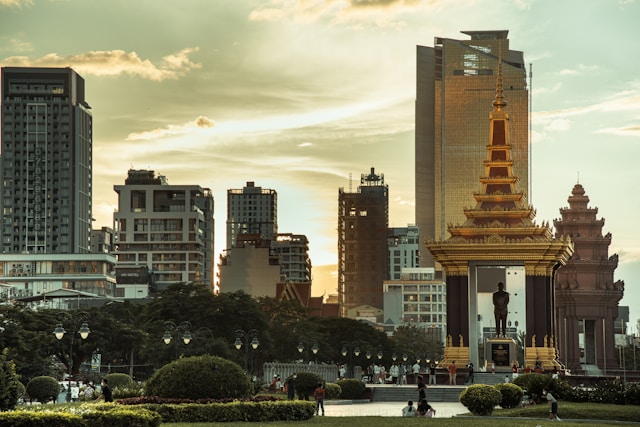
Since 2022, Cambodia has been regarded as the epicenter of a growing human rights crisis linked to a global phenomenon most people only know superficially: spam calls, fraudulent SMS, or phishing emails. What is often dismissed as an everyday nuisance has a dark flip side. Behind many of these digital scams stand highly organized networks — and a system of modern exploitation. Thousands of migrant workers from across Asia, including minors, were lured to Cambodia with promises of well-paid jobs. Instead of regular employment, they face forced labor: they are detained in heavily guarded facilities, abused, and coerced into carrying out fraudulent online activities — the very scams that eventually land on screens around the world.
The Promise and the Trap: How People Are Lured into Slavery
The victims, originating from countries such as China, Thailand, Malaysia, Bangladesh, Vietnam, Indonesia, Taiwan, and Ethiopia, are recruited with promises of high-paying jobs in respectable professions like administration or engineering. Lisa (name changed), an 18-year-old from Thailand, was promised a well-salaried administrative role and even shown pictures of a hotel with a swimming pool, which she never saw in reality. Instead, she and others were smuggled by traffickers at night across a river into Cambodia, where they were imprisoned in so-called scamming compounds.
Recruitment often occurs via social media, with job ads kept deliberately vague and offering unusually high salaries. Transport costs are frequently covered by recruiters or compound managers but are then turned into debt that cannot be paid back. Many victims are brought into the country through irregular migration routes — crossing rivers or jungles undetected — which makes them even more vulnerable. There are well-established networks of traffickers who move victims between compounds within Cambodia, often under the pretense that they are being taken to police stations.

Trapped in a Living Nightmare: Human Rights Violations Inside the Compounds
Once inside the compounds, the true nightmare begins. These facilities display physical and organizational features resembling prisons: high walls topped with razor or barbed wire, guarded gates, numerous security personnel, surveillance cameras, and barred or caged windows. Survivors describe these places as “prisons” and say escape was “impossible.”
The human rights violations inside the compounds are severe and often overlapping:
- Forced Labor and Compelled Criminality:

Under threats of violence, victims are coerced into online scams, such as so-called “pig-butchering scams” where victims are emotionally manipulated before being financially exploited. Many receive no pay at all, or payments far below what was promised. Overtime is used as punishment, and shifts of 10+ hours daily — sometimes even exceeding 16 hours — are the norm. Forced participation in criminal activity increases dependency, as escape attempts are met with threats to report victims’ crimes to authorities.
- Torture and Abuse:
Victims endure torture, physical abuse, or are forced to witness violence.
The brutality — almost always inflicted by compound managers or “bosses” — serves to maintain control, enforce discipline, and extract maximum output. Many compounds have special “dark rooms” solely for punishment. Frequently used tools include electroshock batons, handcuffs, and firearms. Electroshock weapons are inherently abusive and can cause extreme suffering, even death.
- Slavery:
The total control exercised by compound bosses over survivors is tantamount to exercising property rights. Survivors report having been sold into compounds, witnessing others being sold, or being threatened with being sold to another compound. Even when the term “sale” was not always explicitly used, the coerced transfers between compounds, coupled with debts arbitrarily inflated to unpayable sums, reveal a modern form of slavery. Survivors described living under a constant atmosphere of fear.
The State’s Complicity: Why the Crisis Persists
Despite extensive reports by journalists and NGOs and thousands of rescue operations, the Cambodian government has grossly failed to take adequate steps to end these abuses. Amnesty International points to a pattern of state neglect that points to tolerance — even complicity — in human rights violations:
- Ineffective Investigations:
Out of 53 identified compounds, only two were shut down by state intervention. Over a third continued their abuses even after police raids. State interventions are often reactive and superficial; police meet managers at compound gates rather than conducting thorough searches inside.

- Corruption and Collusion:
Evidence suggests systemic corruption and collusion between compound bosses and Cambodian police. Survivors reported that escape attempts or efforts to contact police were discovered by managers, leading to punishments. Some survivors are convinced the police leaked information back to the compounds.
- Failure to Protect Victims:
Cambodian authorities routinely fail to properly identify and protect trafficking victims. After “rescue,” many are held for months in “prison-like” immigration detention centers under poor conditions, forced to pay for basics like food and water, and denied legal or psychological support.
- Regulation Failures:
The government has failed to ban the purchase and use of electroshock weapons, which are widely documented as primary torture tools in compounds. Regulation of private security companies remains inadequate; compound guards carry prohibited weapons such as firearms and electroshock sticks.
- Attacks on Independent Media:
Journalists and human rights defenders reporting on scam compounds face threats and arrests. The independent news outlet Voice of Democracy (VoD) was shut down in 2023, widely seen as retaliation for its reporting on the scam crisis.
To end the entrenched system of digital forced labor, decisive action is required — both from the Cambodian government and the international community. Without effective investigations, prosecutions, and real victim protection, the “living nightmare” will remain a daily reality for thousands of people.
Translated by MMag. Julia Matzinger, BA
#Exploitation #ModernSlavery #Cambodia #Government #NGOs #HumanRightsCrisis #Phishing #ScamNetworks #DigitalFraud #AgainstHumanTrafficking #EndExploitation #EndTrafficking #HopeForTheFuture #Austria
